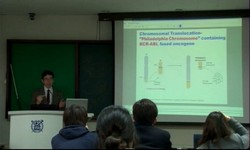Transforming growth factor-$\beta$ (TGF-$\beta$) is the prototypical multifunctional cytokine, participating in the regulation of vital cellular activities such as proliferation and differentiations as well as a number of basic physiological functions...
http://chineseinput.net/에서 pinyin(병음)방식으로 중국어를 변환할 수 있습니다.
변환된 중국어를 복사하여 사용하시면 됩니다.
- 中文 을 입력하시려면 zhongwen을 입력하시고 space를누르시면됩니다.
- 北京 을 입력하시려면 beijing을 입력하시고 space를 누르시면 됩니다.
https://www.riss.kr/link?id=A100877117
- 저자
- 발행기관
- 학술지명
- 권호사항
-
발행연도
1999
-
작성언어
English
- 주제어
-
등재정보
SCIE,SCOPUS,KCI등재
-
자료형태
학술저널
- 발행기관 URL
-
수록면
1-8(8쪽)
- 제공처
-
0
상세조회 -
0
다운로드
부가정보
다국어 초록 (Multilingual Abstract)
Transforming growth factor-$\beta$ (TGF-$\beta$) is the prototypical multifunctional cytokine, participating in the regulation of vital cellular activities such as proliferation and differentiations as well as a number of basic physiological functions. The effects of TGF-$\beta$ are critically dependent on the expression and distribution of a family of TGF-$\beta$ receptors, the TGF-$\beta$ types I, II, and III. It is now known that a wide variety of human pathology can be caused by aberrant expression and function of these receptors. the coding sequence of the type II receptor (RII) appears to render it uniquely susceptible to DNA replication errors in the course of normal cell division. By virtue of its key role in the regulation of cell proliferation, TGF-$\beta$ RII should be considered as a tumor suppressor gene. High levels of mutation in the TGF-$\beta$ RII gene have been observed in a wide range of primarily epithelial malignancies, including colon and gastric cancer. It appears likely that mutation of the TGF-$\beta$ RII gene may be a very critical step in the pathway of carcinogenesis.
동일학술지(권/호) 다른 논문
-
- The Pharmaceutical Society of Korea
- Kim, Dong-Hyun
- 1999
- SCIE,SCOPUS,KCI등재
-
- The Pharmaceutical Society of Korea
- Kim, Hwa-Jung
- 1999
- SCIE,SCOPUS,KCI등재
-
Synthesis and Analgesic and Anti-inflammatory Activities of 1,2-Benzothiazine Derivatives
- The Pharmaceutical Society of Korea
- Lee, Eun-Bang
- 1999
- SCIE,SCOPUS,KCI등재
-
- The Pharmaceutical Society of Korea
- Lee, Hoi-Young
- 1999
- SCIE,SCOPUS,KCI등재







 ScienceON
ScienceON






